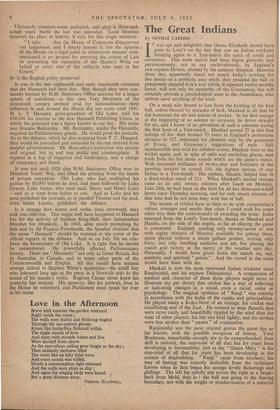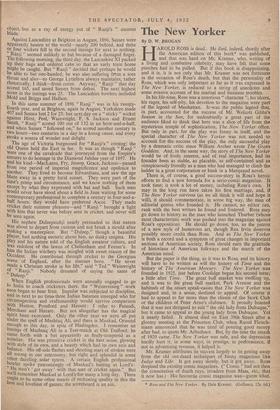The Great Indians •
L'y NEVILLE CARDUS
II, was apt and delightful that Queen Elizabeth should have- gone to Lord's on the day that saw an Indian cricketer bringing again to a Test-match the spirit of youth and adventure. This same match had been begun gloomily and parsimoniously, not to say unchivalrously, by England's new captain Hutton, abetted by the amateur Simpson. Between them they apparently dared not attack India's bowling for two hours on a perfectly easy pitch; they prodded the ball or' pompously stopped it in a way which, if repeated twelve months, hence, will not only be unworthy of the Coronation, but will certainly provide a psychologichl asset to the Australians, who . seldom need anything of the kind.
On a weak side bound to lose from the bowling of the first ball, unless blessed by miracles of luck, Mankad in all that he did honoured the art and nature of cricket. In his first innings at the beginning-of so solemn an occasion, he drove straight for six,.and I know of no precedent of such a solecism during the first hour of a Test-match. .Mankad scored 72 in this first innings of his; then bowled 73 overs in England's portentous advance to 537, redeemed for pleasure only by the gameness of Evans; and Graveney's suggestions of style. Still inexhaustible and avid for relished action, Mankad went to the wicket again, and, in spite of odds and encircling gloom, sent forth from his bat those sounds which are the game's music. With sustained brilliance of stroke-play and liveliness of the sporting instinct he scored 184, the highest innings of any Indian in a Test-match. His captain, Hazare, helped him in a third-wicket stand of 211. When Mankad's second innings came to an end, twenty minutes after 'lunch on Monday, June 24th, he had been on the field for all but three-and-a-half hours since Thursday morning, and for only ninety minutes of that time had he not been busy with bat or ball.
The secrets of cricket have so little to do with competition's values, averages and results that often I could wish for some other way than the score-board's of awarding the prize. India emerged from the Lord's Test-match, thanks to Mankad and Hazare, on the side of the angels, as far as playing the game is . concerned. England, needing only seventy-seven to win with eighty minutes of Monday available for getting them, again played without a single gallant gesture, scoring only forty; not only insulting tradition, and art, but placing the match And victory at the mercy of the weather next day. Personally, I would have given India the match on, say, aesthetic and spiritual " points." And the crowd in the main would have been with me.
Mankad is now the most renowned Indian cricketer since Ranjitsinhji, and his nephew Duleepsinhji. A comparison of method and character of these three players might serve to illustrate my pet theory that cricket has a way of reflecting or indicating changes in a social, even a racial, order or' psychology. The magical opulence. of " Ranji " was entirely in accordance with the India of the rajahs and principalities. He played many a Koh-i-Noor of an innings; his cricket was scintillating and of the East. He seemed to wear flannels that were more easily and beautifully rippled by the wind than the wear of other players; his bat was held lightly, and his strokes were less strokes than " passes " of conjuration. object, but as a ray of energy out of " Ranji's " sinuous blade.
Against Lancashire at Brighton in August, 1896, Sussex were apparently beaten to the world—nearly 200 behind, and three or four wickets fell in the second innings for next to nothing. " Ranji " seemed unlikely to bat because of a damaged finger. The following morning, the third day, the Lancashire XI packed up their bags and ordered cabs so that an early train home might be caught. But " Ranji " decided that perhaps he would be able to bat one-handed; he was also suffering from a sore throat and also—so George Lyttelton always maintains, rather rhetorically, I think—from corns. Anyway, " Ranji " that day scored 165, and saved Sussex from defeat. The next highest score in the innings was 25. The Lancashire bowlers included Mold and Briggs and Hallam.
In this same summer of 1896 " Ranji " was in his twenty- fourth year, and at Brighton, again in August, Yorkshire made 407 and Sussex lost 2 for 23; but next day on a " sticky " wicket against Hirst, Peel, Wainwright, F. S. Jackson and Ernest Smith, " Ranji " scored 100 out of 132 in an hour-and-a-half, and when Sussex " followed on," he scored another century in two hours—two centuries in a day in a losing cause, and every stroke a source of wonder and delight. The age of Victoria burgeoned for " Ranji's " coming; the old Queen held the East in fee. It was as th6ugh " Ranji " were one of the cavalcade that journeyed from the Empire's corners to do homage in the Diamond Jubilee year of 1897. He and his kind—MacLaren, Fry, Jessop, Grace, Jackson—passed from one period of imperial magnificence and opulence to another. They lived to become Edwardians, and saw the age blaze away in a pretty lurid sunset. They were part of the time's pomp and circumstance, and we know nothing of them except by what they expressed with bat and ball. Such men would never have stood about a field in June waiting for some contemporary professional to complete a century in four-and-a- half hours; they would have preferred Ascot. They made cricket their summer pleasure—and " Ranji " brought a light with him that never was before seen in cricket, and never will be seen again.
His nephew Duleepsinhji nearly persuaded us that nature was about to depart from custom and not break a mould after making a masterpiece. But " Duleep," though a beautiful player, had nothing esoteric about him, no dusky enigma. His play and his nature told of' the English amateur culture, and was redolent of the lawns of Cheltenham and Fenner's. In him the Indian witchery was mingled with sweet reason of the Occident. He contributed through cricket to the Georgian scene of England, after the manner born. " He never made a Christian stroke in his life," said " Ted " Wainwright of " Ranji." Nobody dreamed of saying the same of " Duleep."
When English professionals were annually engaged to go to India to coach cricketers there, the " Westernising " work soon began to bear fruit. Impulse was subjected to discipline, and in next to no time, three Indian batsmen emerged who for circumspection and craftsmanship would survive comparison with Hutton, Ponsford and Hassett: I refer to Pataudi, Merchant and Hazare. But not altogether has the magical spirit been exorcised. Only the other year we were all put under the spell of Mushtaq Ali, and there is Mankad, Oriental enough to this day, in spite of Haslingden. I remember an innings erf Mushtaq 'Ali in a Test-match at Old Trafford; he came forth with a bat apparently as finely-tempered as a scimitar. His was primitive cricket in the best sense, glowing with style of its own, and a beauty which had its own axis and balance. His off-side flashes and shooting stars of strokes were all wrong in our astronomy, but right and splendid in some other dazzling solar sytem. A certain English professional bowler spoke patronisingly of Mankad's batting at Lord's : He won't get away' with that sort of cricket again." But well remember Mankad at Lord's for many a long day. There ought to be some other means of reckoning quality in this the best and loveliest of games; the scoreboard is an ass.,



























































 Previous page
Previous page